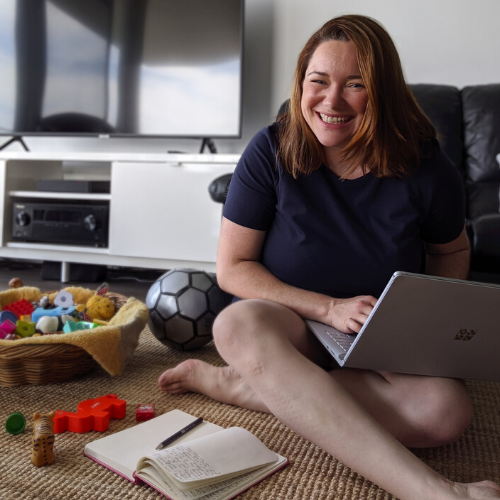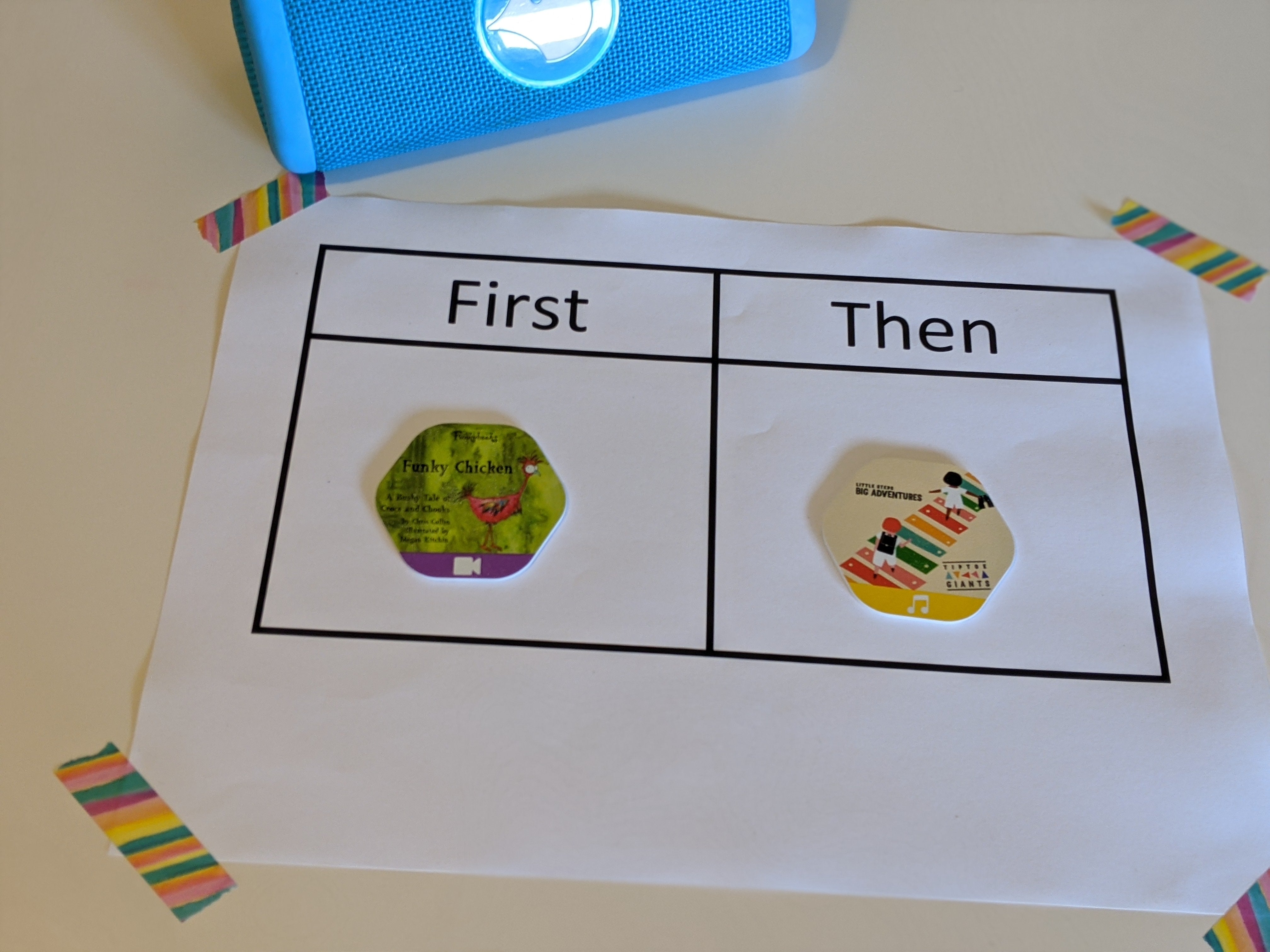I’m an Occupational Therapist and Mum to a toddler who works a lot from home (even before a certain pandemic hit us all) and I have found Birde to be an invaluable tool to help me squeeze in some writing and zoom meetings, enhance our play together and make our daily routines smoother. I have recommended it to friends and family for so many reasons and when Jess from Birde got in touch asking if I would write a blog post for them I jumped at the chance.
I thought I’d share some of the reasons why I love Birde here, including the therapeutic and developmental benefits of including Birde in your home and everyday routines. I should confess up front too that we have only ever used Birde as a speaker and so all of the recommendations below are made with screen-free time in mind.
How can I use Birde to help with our everyday family routines?
School holidays are intertwined in my memory with long car rides- counting animals, looking for the first glimpse of snow or beach and falling asleep in the backseat. I love a good family road trip - the freedom to get in the car and go, find a brilliant pie shop and a hidden bush walk spot - and so before my daughter was even born I had planned out day trips and mini-getaways all over the countryside.
But then, she had other ideas.
The early days car rides were only short distances but they were filled with angst, stress and tears (hers and mine).
There’s lots of reasons why some babies don’t like being in the car (motion sickness, boredom, hates being alone or confined - none of which are helpful to know if you can’t fix them). And so I started madly searching for solutions. A lot of the suggestions were to turn the seat around (but she was so little I wanted to keep her facing backwards as long as possible), let her cry it out (I don’t think the people who suggest this know how distracting that can be when you are trying to operate heavy machinery!) or pull over to the side of the road to comfort her before getting back in and starting the process all over again (hardly practical).
As an Occupational Therapist a key part of what I do is adapt everyday routines to get better outcomes. I needed something to change so I could get to and from the shops, let alone my long held dream of driving out in to the country for berry picking. And Birde became my go to solution. It was such an easy fix, it was immediate and I could actually do it without compromising her safety or my sanity.
In the car
We bring Birde and our little pouch of seeds along with us on most car rides now. It’s great that it allows kids the option to choose what they want to listen to, over and over again sometimes, without adding headphones into the routine. This means we can still point out things we see along the way, have chats about where we are going and increase the opportunities for conversation and interaction. Often, a car ride is where we feel most comfortable unpacking what happened at school or at a friend’s place after a playdate and I want to encourage those conversations even from an early age. If the habits and routines of listening with headphones are already established, it can be hard to encourage those little morsels of communication.
Extending bath time and other self-care routines
Another family routine that can benefit from introducing Birde is bath time (thank goodness Birde is splashproof!). Whether you are trying to extend or limit the amount of time in the bath for your little one Birde can help, with one more seed, one more story or one more song providing a clear end point. By providing prompts that are both concrete and external from you just repeating it’s time to get out, your child has more warning and can adjust to the change of getting out of the bath.
Whenever there are challenging behaviours it is always more effective to spend your time and energy before the behaviour occurs, rather than after dealing with the consequences. Setting limits like ‘how much time’ can be really helpful to create a familiar routine that reduces or avoids the challenging behaviour. You can use Birde songs as a prompt for how long to brush their teeth, sit on the toilet, brush their hair or get dressed; increasing their independence with the task and reducing the need for you to prompt (again).
Helping with cleaning up around the house; finishing play time etc.
Many toddlers go through a phase of being incredibly interested in tidying up and cleaning (I have to admit in our house it was very short lived) but when that golden age is over and you find yourself wading through the debris of the latest play session it’s time to get them to pitch in and help pack away. Like with most chores the sooner this becomes part of your routine the easier it will be to get them on board – but there are some helpful strategies that can make it more likely for them to say yes. Firstly, set realistic expectations for yourself. One minute for every year they have is a good starting point (e.g. 2 year olds pack away for 2 minutes, 5 year olds for 5 minutes). Birde can help set this time guideline too. Visually it helps to designate a particular type of toy (like “first let’s get all the cuddly toys then the books”), a colour (“can you get all the green cars first”) or space on the ground with a hulahoop (“put all the toys inside the hoop away in their home”). Or pair the toys to pack away with a song or story – “let’s pack away the trains while we listen to a Thomas story” or “tidy up the coloured pencils and crayons until ‘I can sing a rainbow’ is finished”
Birde can also be used as a transition activity between play and other activities like mealtimes or homework. Instead of going straight from a high energy trampoline session to trying to do this weeks spelling list, add in a kitchen dance party to Justine Clarke’s hits and a quick sip-n-crunch snack to help make the transition smoother.
Time-in to help with anxiety and challenging behaviour
Self-regulation is frequently held up as an important skill for children to master, but too often the expectation is that this is mastered at a very young age and without a clear pathway to get there. One strategy that can help organise feelings and develop emotional regulation skills is including time in your day to just be together, with nothing else on the agenda. I like to call this ‘blank space’ if I’m thinking about how my daily schedule looks on a calendar or ‘time-in’ if I’m thinking about helping a chlid develop their emotional regulation skills.
Scheduling in some ‘time-in’ with your little one (instead of using time outs to manage anxiety, frustrations and challenging behaviours after they have happened) is a great way to help you connect with each other, help your little one process some big feelings or just unpack the day-to-day events. Sometimes it’s easy to do this as part of a bedtime routine, in the afternoon or as part of a slow weekend morning. And other times it is an effort to carve out this time in a busy schedule.
The idea is to create a space in your day to just have some down time together. In some ways it can be a pre-cursor to including a meditation practice in your day. The Dinosnores Forest Night soundscape is a favourite of mine to pop on and provide some background noise to our ‘Time-in’. For some of us just sitting and being with our feelings will be a challenge so feel free to add in an activity like colouring, painting each other’s nails or building with lego to get you started. You can introduce the idea to your child that this is some special time just the two of you to be with each other and talk about anything we want to. Follow your child’s interests, ask questions and if needed help them understand their own feelings (and how others might have felt in the situation).
Stay tuned for more soon...



Leave a comment
This site is protected by hCaptcha and the hCaptcha Privacy Policy and Terms of Service apply.